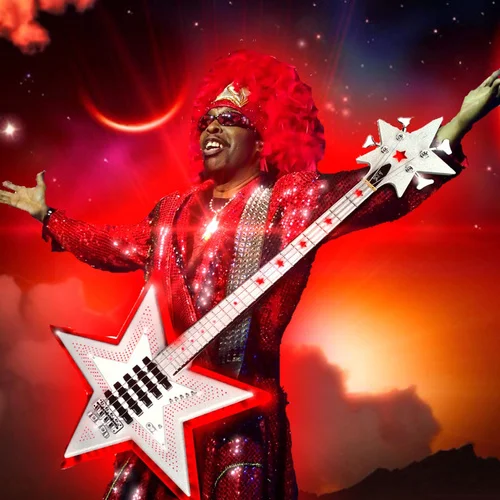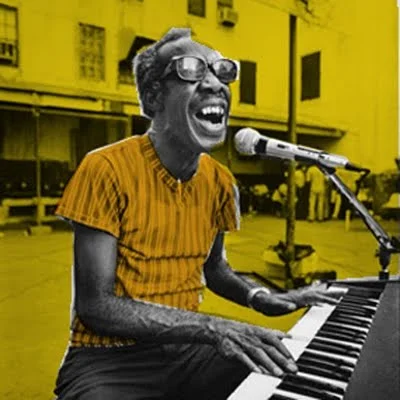By The Landlord
"You gotta play on 'the one'!"- James Brown
"I learned from Hendrix." - Prince
"Funk is the absence of any and everything you can think of, but the very essence of all that is." – Bootsy Collins
Almost a year ago today, on 21 April 2016, Prince Rogers Nelson suddenly, and tragically, passed away. So to pay tribute to him and all the the music that he inspired and was influenced by, this week we look at the genre that was at the centre of his music and one he also revolutionised. But what is funk? This isn't a technical question, because we all know, deep down in our bodies how it feels. It's a throb, a thrust, a bass line and a rhythm that makes us dance. It's a groove, it's sexy, it's often syncopated, it's also the space between the beats and the notes. It can also be sparse, cutting out many parts of jazz, gospel and African music from whence it came. So for this week's topic there's no need to get bogged down in the music definitions, let's simply play it, share it, and feel it.
So to celebrate this, let's look at an incredible moment of spontaneity at a James Brown concert where the great man first brings Michael Jackson on to the stage, and then Prince. The atmosphere is electric, charged with pure funk. Prince is so overcome he can barely control himself, and first plays guitar, then strips off and begins to howl. This is the real deal:
But let's remember also that funk doesn't only appear in songs specifically of that genre, and in some ways the object of this week's topic is to show how it springs up in many other forms of music as well as nail a few stone-cold classics. Missy Elliott, who is pretty funky and innovative herself, has strolled in the bar, and is here to tell us how funk has filled her imagination:
"I still go on YouTube and watch the old performances and the 'Soul Train' lines. I'm still amazed by how much soul and funk the music and dancers had." That's a top tip, Missy. And so with that, let's enjoy the infinite joys of this 1970s TV show, and those wonderful pairs of dancers who spontaneously did their thang for those 15 seconds of fame. This will no doubt also inspire quite a few song nominations:
Who else is is around? Here's another hip-hop / funk artist, André Benjamin, aka André 3000 from OutKast, who walks in, dappily dressed, and with a wink, an ironic dig, and a swagger, tells us amusingly just how important funk is: "The world doesn't need another clothing company. But it does need a certain funk."
Aaron Neville's soulful voice is often associated with soul, but he describes his brothers as a funk band. Chad Smith, drummer from The Red Hot Chilli Peppers is also here, tapping enthusiastically on the bar, and describes how his fellow band members "Flea and Anthony are into funk, like old school Meters and stuff like that," which has obviously had a big influence on the Chillis.
Led Zeppelin's Robert Plant once ironically called out "Where is that confounded bridge?" at the end of a song, as a parody of James Brown, but the latter's influence is tangible alongside blues and other artists. The Smiths is not a band you would associate with funk, or would you? Funk is all about giving instruments a rhythmic role, and Johnny Marr's majestic guitar playing certainly shows plenty of evidence of that. You could also cite many postpunk bands, such as Talking Heads, The Pop Group, Cabaret Voltaire, D.A.F., A Certain Ratio, 23 Skidoo, who influenced him, and more recently Chk Chk Chk (also known as !!!) who have funk at the heart of their postpunk.
But Smiths bassist Andy Rourke is also in the bar now, and says: "When I started playing the bass, I became kind of fascinated by it and started investigating various styles of bass playing, and I was really struck with funk music, mainly American funk music - Stanley Clarke, Funkadelic and that kind of stuff. That comes out in a couple of songs like Barbarism Begins at Home."
Bootsy Collins
And funk's influence continues to this day. Here's King Krule, only 22 years old, whose music mixes punk jazz, hip hop, darkwave, and trip hop. What are his influences? "Stuff like Buena Vista Social Club and Fela Kuti were quite a main thing to my childhood. As soon as I reached an age where I realized that Fela was singing in English, when I got past his accent, I loved the rawness of it, and the funk and the rhythm and the melody." So funk is in everything, with artists as diverse as Tony Allen to Public Image Ltd with Jah Wobble, all the way to Beyoncé.
Funk is all about the rhythm. Lenny Kravitz points out that "if you listen to a lot of old funk records, the drums are really small. But you don't perceive it like that because the groove is so heavy." So what is the groove? Let's have a quick potted history.
Professor Longhair
Funk perhaps began in New Orleans in the 1940s where artists such as Professor Longhair, drawing on the Mardi Gras culture of carnival and Cuban music, used the piano as syncopated rhythm instrument with an onbeat/offbeat motif in a rumba-boogie. But the big step came in the 1960s with the Godfather himself, who emphasised the downbeat, "the one". Instead of the traditional one-two-three-four backbeat of traditional rock and roll or soul music, he shouted and screamed at this band for the one-two-three-four downbeat, for the emphasis on the first beat of the four-beat bar, not the second and fourth. It was a true revolution and many of his songs were also continuous rhythmic riffs, leaving out the traditional verse-chorus structure, just boiled down brilliance – infectious, sexy, screaming, chopping, syncopated, raw but totally tight and controlled. Let's enjoy a slightly later, Nixon-era song from Brown as an example, with some messages that could apply today:
The 1970s then brought Sly and the Family Stone, and the wobbly wacky world of George Clinton and Parliament, both obvious areas to nominate this week. Funk by now was not only a form of music, but a political movement associated with civil rights and the Vietnam War, but Clinton took it into another world. There are many examples, but here's a classic:
This decade may be the richest source for the topic, but let's also remember that from it there have also been many funky female artists. Get a load of Lyn Collins, for example. Makes you think, eh?
And before her big 1980s hit era, Chaka Khan was deep in the funk groove, here with Rufus:
Funk isn't all about the guitar, drums and bass as rhythm instruments. Stevie Wonder can do the business with the keyboard too:
And let's now sample something that certainly influenced Prince, from George Clinton associates Zapp & Roger in 1980. More Bounce to the Ounce is a phrase that sums up what funk is all about:
And then came Prince, who, alongside The Time and other friends, helped create what was called the "Minneapolis Sound" in isolation from the big cities east and west, into a fusion of funk, R&B, rock, pop and new wave. At his peak, perhaps with came with the albums Sign of the Times and Lovesexy, but that's one of many areas for discussion below.
And funk's influence is found and is spread across the musical map. You could dip into, for example, Afrika Bambaataa's electro funk, influenced by Yellow Magic Orchestra and Kraftwerk, or metal funk, such as Living Colour, various jazz funk fusions, including by Herbie Hancock or later Miles Davis. The funk world is your oyster, but the key thing is, as James Brown put it: "The one thing that can solve most of our problems is dancing."
So then, this week's funky president, and godfather of grooves, is not, takeitawayGuru, as planned who will now do a slot in May, but is in fact me, The Song Bar Landlord. Put your song suggestions in comments below, and let's have a funky good time. Deadline? The party ends 11pm on Monday UK time or early if I ring the bell with notice, for playlists published on Wednesday.
Prince Rogers Nelson ... 7 June 1958 - 21 April 2016
New to comment? It is quick and easy. You just need to login to Disqus once. All is explained in About/FAQs ...
Fancy a turn behind the pumps at The Song Bar? Care to choose a playlist from songs nominated and write something about it? Then feel free to contact The Song Bar here, or try the usual email address.




